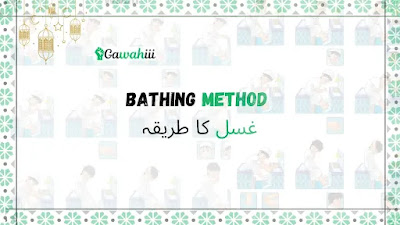Etiquette and Sunnah of Ghusl
Sometimes after waking up in the morning, it is necessary to perform a ghusl for janaabah (which is obligatory). Thus, if one has a dream and wakes up in the morning and sees traces of semen on one’s clothes, then ghusl is obligatory. And if one has a dream but wakes up in the morning and sees no traces on one’s clothes, then ghusl is not obligatory. And if one does not remember having a dream, but when one wakes up in the morning, one sees traces on one’s clothes that indicate that one has had a dream, then ghusl is obligatory whenever it is obligatory. It should be noted that this is also the case for women, because some women also have dreams. For more details on this issue, one should refer to a jurist. Because the purpose here is not to discuss the issues, but to explain the obligation of ghusl and its Sunnah method.
In Surah Al-Ma’idah, it is said: “And if you are in a state of janaabah, purify yourself thoroughly.” And if you are in a state of janaabah, then purify yourself thoroughly. (Al-Quran, Surah Al-Ma’idah: 6)
It is understood that ghusl becomes obligatory due to being junub. Unless there is a compulsion, for example, if one is sick, there is a risk of life from using water, or there is a risk of the disease worsening, or there is difficulty in obtaining water. For example, if there is a risk of enemy attack on the water or water is not available,
then one should perform tayammum in all such cases.
Sunnah method of performing Tayammum
First, one should make the intention of purification, then lightly strike both hands on pure soil and rub it all over the face. Similarly, strike the soil again and rub it all over the hand, including the elbow.
Then, in this way, tayammum becomes equivalent to ghusl. For more details about these issues, one should refer to the books of jurisprudence.
Angels of mercy do not enter a house where there is junub
Some people are lazy in performing ghusl, which is highly undesirable. It is stated in the Hadith Sharif that if a person does not perform ghusl for janaabah after dawn and remains in a state of janaabah, the angels of mercy will not enter that house. (Sahih Muslim: 846)
The Sunnah method of performing ghusl?
Hazrat Aisha (may Allah be pleased with her) said that when the Messenger of Allah (peace and blessings of Allah be upon him) intended to perform ghusl for janaabah, he would first wash both his hands, then perform ablution as one does for prayer, then dip his fingers in water, then take them out and rub them through the roots of his hair, then take three handfuls of water with both his hands and pour it on his head, and then pour water over his entire body. (Sahih Bukhari: 248)
A narration by Muslim states that when the Messenger of Allah (peace and blessings of Allah be upon him) began ghusl, he would pour water from his right hand onto his left hand, then perform ablution and then perform ablution. (Sahih Muslim: 316)
In conclusion, it is obligatory to wash the entire body in a bath, so that not even a hair-sized area remains dry. Since the inside of the nose and mouth are considered external parts of the body, rinsing and pouring water into the nose are obligatory in a bath for janaabah.
Here, there are three obligatory acts in a bath for janaabah:
(1) Rinsing.
(2) Pouring water into the nose.
(3) Pouring water over the entire body.
All the other actions mentioned in the above traditions are called Sunan.
Etiquette and Sunnah of Bath
1. Washing the part of the body that is contaminated with impurity three times. (Sunan Tirmidhi: 106)
2. Purifying oneself from both urine and feces. (Sunan Tirmidhi: 105)
3. After washing the private parts and impurities, rub the left hand with soil (if soil is not available, clean thoroughly with soap, etc.). (Sahih Bukhari: 158)
4. Perform complete ablution before bathing. If the water from bathing is accumulating on the feet, then do not wash the feet during ablution, but move away from here and wash the feet at the end. (Sahih Bukhari: 249)
5. First pour water on the head, then pour enough water on the right and then the left shoulder to reach the entire body, then touch the body with the hands, and do this three times. (Sunan Tirmidhi: 107)
6. After bathing, it is proven that wiping the body with a cloth is also permissible, and it is also not permissible to wipe it. Therefore, whichever way you choose is correct with the intention of being Sunnah. (Sunan Tirmidhi: 108)
Rule: It is Sunnah to perform ghusl in four ways:
(1) Ghusl for Friday prayer. (Sahih Bukhari: 877)
(2) Ghusl for the two Eids. (Sunan Ibn Majah: 1315)
(3) Ghusl for entering the state of Ihram for Hajj or Umrah. (Sunan An-Nasa’i: 262)
(4) The person performing Hajj should perform ghusl after the sun has set on the day of ‘Arafah. (Muzahir al-Haqq: 1/104)
In general, there are three obligatory ghusl, six sunnah ghusl, and four sunnah ghusl. If you perform ghusl in addition to these ways, then with the intention that cleanliness is loved by Allah and His Messenger (peace and blessings of Allah be upon him), you will receive the reward of a sunnah, God willing.
غسل کے آداب اور سنتیں
صبح اٹھنے کے بعد بعض مرتبہ غسل جنابت ( جو فرض ہے ) کرنا ہوتا ہے۔ اس طرح اگر خواب میں احتلام ہو جائے اور صبح اٹھ کر کپڑوں پر منی کا اثر دیکھے تو غسل واجب ہو گا اور اگر خواب میں احتلام ہوا مگر صبح اٹھ کر کپڑوں پر کچھ بھی اثر نہ دیکھا تو غسل واجب نہیں ہوگا اور اگر احتلام ایسے یاد نہیں مگر جب صبح اٹھا تو کپڑوں پر ایسے آثار دیکھے جیے کہ احتلام ہوا ہو، جب بھی غسل واجب ہوگا۔ واضح رہے کہ یہی مسئلہ عورتوں کے لیے بھی
ہے کیونکہ بعض عورتوں کو بھی احتلام ہوتا ہے۔ اس مسئلہ کی مزید تفصیلات کے لیے کسی فقیہ کی طرف رجوع کیا جائے۔ کیونکہ یہاں مسائل پر بحث کرنا مقصود نہیں بلکہ غسل کی فرضیت اور اس کا مسنون طریقہ بیان کرنا مقصود ہے۔
سورۃ المائدہ میں فرمایا: “وَإِن كُنتُمْ جُنُبًا فَاطَّهَّرُوا” اور اگر تم کو جنابت ہو تو خوب اچھی طرح پاک ہو جاؤ۔ (القرآن، سورۃ المائدہ: 6)
معلوم ہوا کہ جنبی ہونے کی بناء پر غسل فرض ہو جاتا ہے۔ الا یہ کہ کوئی مجبوری ہو مثلاً بیمار ہے پانی کے استعمال سے جان کا خطرہ ہے یا بیماری کے بڑھنے کا خطرہ ہے یا پانی کے حصول میں دشواری ہے۔ مثلاً جائے پانی پر دشمن کے حملہ کا خطرہ ہے یا پانی نہیں مل رہا ہے تو
ایسی تمام صورتوں میں تیمم کر لے۔
تیمم کرنے کا مسنون طریقہ
پہلے پاکی کی نیت کرے، پھر پاک مٹی پر ہلکے سے دونوں ہاتھ مارے اور پورے منہ پر پھیر لے۔ اسی طرح دوبارہ پاک مٹی پر ہاتھ مار کے پورے ہاتھ پر کہنی سمیت پھر لے
تو اس طرح تیمم غسل کے قائم مقام ہو جاتا ہے۔ ان مسائل کے بارے میں مزید تفصیلات کے لیے کتب فقہ کی طرف رجوع کیا جائے۔
جس گھر میں جنبی ہو، وہاں رحمت کے فرشتے داخل نہیں ہوتے
بعض لوگ غسل کرنے میں سستی کر جاتے ہیں، یہ انتہائی ناپسندیدہ بات ہے۔ حدیث شریف میں فرمایا گیا ہے کہ اگر فجر ہو جانے کے بعد آدمی غسل جنابت نہ کرے اور جنابت کی حالت میں پڑا رہے تو اس گھر میں رحمت کے فرشتے داخل نہیں ہوتے۔ (صحیح مسلم: 846)
غسل کرنے کا مسنون طریقہ
حضرت عائشہ رضی اللہ عنہا فرماتی ہیں کہ رسول اللہ صلی اللہ علیہ وسلم جب غسل جنابت کا ارادہ فرماتے تو پہلے اپنے دونوں ہاتھوں کو دھوتے، پھر وضو کرتے جس طرح نماز کے لیے وضو کیا جاتا ہے، پھر انگلیاں پانی میں ڈالتے، پھر انہیں نکال کر اپنے بالوں کی جڑوں میں خلال فرماتے، پھر اپنے دونوں ہاتھوں سے تین چلو پانی لے کر سر میں ڈالتے اور پھر اپنے تمام بدن پر پانی بہاتے۔ (صحیح بخاری: 248)
مسلم کی ایک روایت میں یہ الفاظ ہیں کہ جب آپ صلی اللہ علیہ وسلم غسل شروع کرتے، اپنے داہنے ہاتھ سے بائیں ہاتھ پر پانی ڈالتے، پھر استنجاء کرتے اور اس کے بعد وضو فرماتے۔ (صحیح مسلم: 316)
خلاصہ یہ ہوا کہ غسل میں پورے جسم کو دھونا فرض ہے حتی کہ ایک بال کے برابر بھی جگہ خشک نہ رہ جائے، ناک اور منہ کے اندرونی حصے چونکہ جسم کے ظاہری حصے کہلاتے ہیں اس لیے کلی کرنا اور ناک میں پانی ڈالنا غسل جنابت میں فرض ہے۔
یہاں غسل جنابت میں تین فرض ہوئے:
(۱) کلی کرنا۔
(۲) ناک میں پانی ڈالنا۔
(۳) پورے جسم پر پانی ڈالنا۔
باقی تمام افعال جو روایات مذکورہ میں ہیں، سنن کہلاتے ہیں۔
غسل کے آداب اور سنتیں
1. جسم کے جس حصے پر ناپاکی لگی ہوئی ہو، اس کو تین مرتبہ دھونا۔ (سنن ترمذی: 106)
2. پیشاب اور پاخانہ دونوں سے استنجا کرنا۔ (سنن ترمذی: 105)
3. شرمگاہ اور نجاست وغیرہ دھونے کے بعد بائیں ہاتھ کو مٹی سے رگڑنا (مٹی پاس نہ ہونے کی صورت میں صابن وغیرہ سے خوب صاف کرنا)۔ (صحیح بخاری: 158)
4. غسل سے پہلے پورا وضو کرنا اگر نہانے کا پانی قدموں میں جمع ہو رہا ہے تو پھر وضو میں پیروں کو نہ دھوئے بلکہ آخر میں یہاں سے ہٹ کر پاؤں دھوئے۔ (صحیح بخاری: 249)
5. پہلے سر پر پانی ڈالنا، پھر دائیں اور پھر بائیں کندھے پر اتنا پانی ڈالنا کہ پورے جسم تک پہنچ جائے، پھر بدن کو ہاتھوں سے ملنا، اس طرح تین بار کرنا۔ (سنن ترمذی: 107)
6. غسل کے بعد جسم کو کپڑے سے پونچھنا بھی ثابت ہے اور نہ پونچھنا بھی۔ لہذا جو بھی صورت اختیار کریں سنت ہونے کی نیت سے درست ہے۔ (سنن ترمذی: 108)
قاعدہ: چار صورتوں میں غسل کرنا سنت ہے:
(۱) نماز جمعہ کے لیے غسل کرنا۔ (صحیح بخاری: 877)
(۲) عیدین کے لیے غسل کرنا۔ (سنن ابن ماجہ: 1315)
(۳) حج یا عمرے کے احرام کے لیے غسل کرنا۔ (سنن نسائی: 262)
(۴) حج کرنے والے کو عرفہ کے دن بعد زوال آفتاب غسل کرنا۔ (مظاہر حق: 1/104)
فی الجملہ غسل کے تین فرض، چھ سنتیں اور چار صورتوں میں غسل کرنا سنت ہوا۔ ان صورتوں کے علاوہ بھی غسل کریں تو اس نیت سے کہ صفائی اللہ اور اس کے رسول صلی اللہ علیہ وسلم کو محبوب ہے، ان شاء اللہ سنت کا ثواب ملے گا۔
- Also read
- To be continue click here


